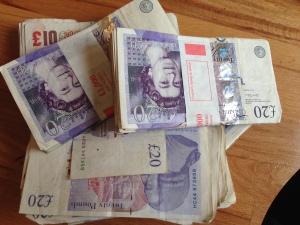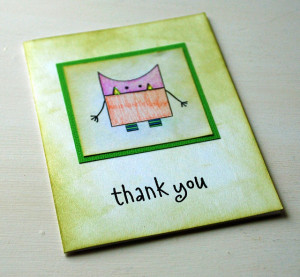In the third post of the series about bringing her own writing to the stage, Kimberley Andrews talks money: can you produce a show without breaking the bank and should you dare to dream of making a profit?

Producing my own show was many things: it was a small glimpse in to what it might be like to be a producer (two words: hard work). It was fun and at times, chaotic. Most of all it was empowering; not in a ‘holy crap, I think I’ve just become Andrew Lloyd Webber and I’m going to dominate the West End for at least a generation’ kind of way, of course. But it was empowering to know that my work would never again be left to languish in the back of a drawer; all I had to do was pull my socks up and produce it myself.
What producing didn’t do was make me a large sum of money. This wasn’t because nobody bought tickets, in fact we sold out. And it wasn’t because we spent ridiculous amounts of money on elaborate costumes and revolving sets and a live orchestra. It’s just that with numerous outgoings and a limit on what you can charge for tickets, producing a small-scale show is never going to be a great money-spinner. It’s not all bad though – if you stick to a tight budget, you can break even, meaning you have enough money to produce another show in the future…

The first thing I did was to set the ticket price based on what others were charging for similar shows – which in our case, was £6. Now, I could have tallied up my outgoings first and based the ticket prices on covering the total. In fact, I could have charged £200 per ticket and then sipped Piña Colada’s in St Tropez for a couple of weeks on the profits. But I had to be honest with myself, who in the right mind would part with this sort of cash to see a show by an unknown writer? And could I justify increasing the ticket price to cover outgoings when my potential audience could just as well go and book a cheaper show? I wouldn’t have charged less than the ‘going-rate’ either – if you can make a few quid to stick in the pot for future shows and maybe buy yourself a Mars Bar, then go for it.
Setting the ticket price first gave me a clear idea of what kind of money I could spend on my show, which in turn, helped me to budget production costs effectively. The bottom line was that I only stood to make a couple of hundred pound even in the event of the show selling out. In the worse case scenario, if no one bought any tickets, I stood to make absolutely nothing, which as well as being a bit miffed, meant covering production costs out of my own pocket.

Now, like most writers, I don’t have money to burn – old first drafts of scripts maybe, but not money. So, as I was producing a sketch show, with other writers also contributing, I asked them if they’d split the costs with me. Split between 6 people, the £150 hire fee was only £25 each, a small amount to lose if no one turned up.
I was also really frugal about production costs, which meant working everything out beforehand in excruciating detail. Writing a list of everything you need to pay for and then adding it all up isn’t rock n’ roll, but it will stop you from getting a credit card bill that gives you palpitations later on…
Here’s what my outgoings looked like… (Please note that these prices are a couple of years old so will have no doubt increased)
Venue Hire [£150] – while you can get away with minimal set and props and pass it off as a stylistic choice, the cost of the venue is what it is and will most likely take up most of your budget. (See my previous post on finding a venue for tips.)
Actors/ Technical Staff/ Director [£40] – ok, so I didn’t pay mine but I did get them all a card and a bottle of wine to say thank you at the end.
Marketing [£27] – some might argue that you don’t need flyers for a one-off show what with the power of social media these days, but most venues ask for them and they’re useful for sticking on noticeboards etc. I roped in a creative friend who took a photo of a lettuce wearing sunglasses for mine; you don’t have to include stylish salad items but do make them eye-catching. I used a cheap online printing company for mine, a Google search will bring up a plethora of good deals. Getting them in postcard size saves money and you don’t really need more than 100 for a small show.
Props [£10] – I had a character who drank Lambrini and another who ate lots of Wotsits (yeah, it was a classy show), so I did have to purchase some props but do beg, steal and borrow where you can. It’s worth checking out whether the venue has a props store/ random junk cupboard that you can raid or seeing if you can call in favours from friends who work in theatres or drama schools. If not, hit the charity shops or raid your own wardrobe.
Printing [£0] – you’ll be expected to print out scripts for actors and programmes for the night, I managed to do mine for free because I work in an office but if you do have to pay, you can keep the cost down by getting rid of page breaks after scenes and keeping the programmes in black and white and on one page only. And if you don’t have a printer, avoid getting stung by expensive internet cafe’s by doing your printing at the library. If you’re doing a script-in-hand performance and you make lots of edits during rehearsal, you may need to print off edited copies for the performance, so do try to budget for that too.
Bits and bobs [£10] – bear in mind that there’ll always be a few extras involved, perhaps you’ll need a chat with the director and you’ll want to get them a coffee or maybe someone will misplace a prop on the day and you’ll have to run out and replace it.
Total outgoing: £237
Just for the record – at the time, the Hen & Chickens deducted £1.50 from each ticket for a membership scheme. So, although we sold tickets at £6, in reality, we got £4.50. We sold 54 tickets meaning we made a grand total of £243 and a profit of a whole £6! Mars Bars all round then…
My three top tips:
- Split the costs! If you haven’t got other writers contributing, ask the director or see if you can bring a co-producer on board. Not only will you reduce your own financial risk but you’ll getting extra commitment from contributors who won’t want to lose their money by dropping out at the last minute.
- Share the profits! Of course, if you’re splitting costs, it goes without saying that you have to split your profits, unless you want to lose friends. That also goes for actors or technical staff that you aren’t paying
- Say thanks! If people have worked for free, get them a thank you card and a bottle of wine or a drink at the bar after the show. But don’t go nuts and spend a fortune on gifts, if you can afford to do this I think most struggling artists would just prefer the cash.
Next time Kimberley discusses casting: where to find actors, whether you should feed them and what to expect when you’re asking people to work for free. Previous posts: Part 1: Getting Started & Part 2: Finding a venue


